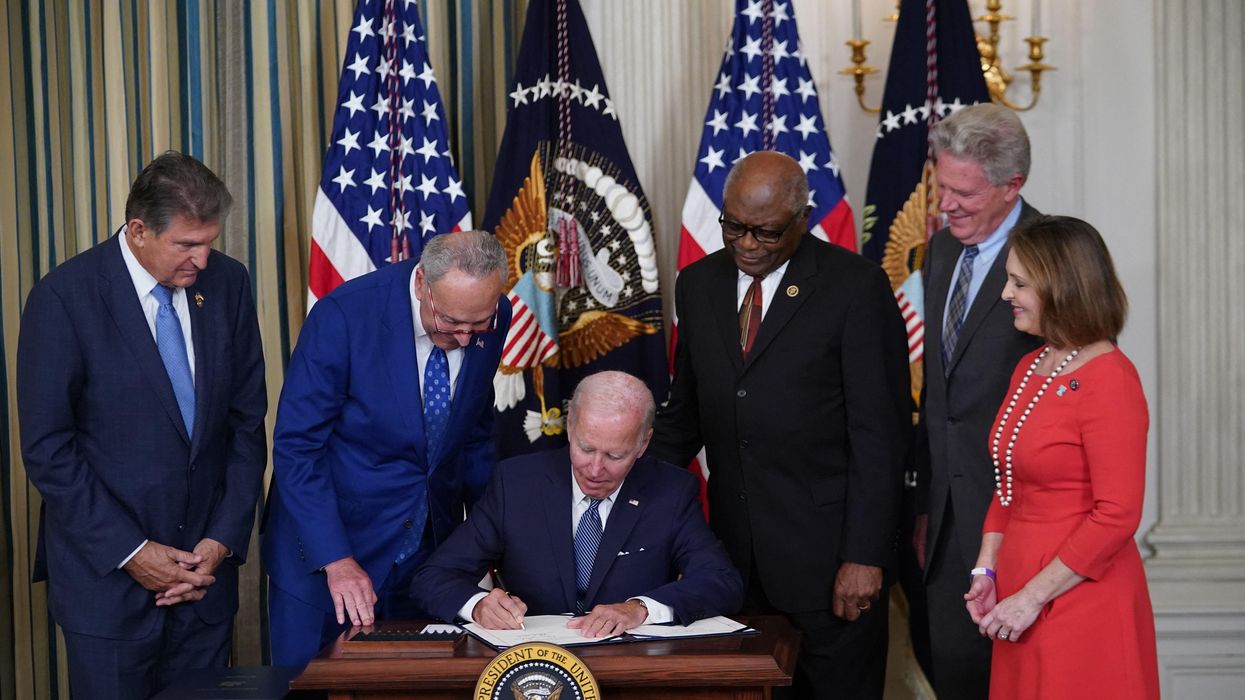On Tuesday, President Biden signed into law the Inflation Reduction Act, a massive alteration to climate change, health care and tax policy. Although the bill passed both chambers without any Republican votes, most of its major provisions have bipartisan backing, according to new data from the University of Maryland.
While Biden and congressional Democrats will claim passage of the IRA as the latest in a string of policy victories for their side, others view this as a win for the American people despite a polarized government.
Over the 20 components studied by PPC and Stanford University's Deliberative Democracy Lab, the vast majority have support among the general public and 13 items garnered backing of both Democrats, Republicans and independents.
“Majorities support 19 of 20 major proposals in the legislation,“ said Steven Kull, director of the school’s Program for Public Consultation, which produced the report. “While there has been grave concern about the state of our democracy, the movement of this bill should give Americans hope that our system can and does work, and that Congress is acting to reflect the will of the people.”
PPC broke the proposals down into four categories: energy and environment, workforce development, taxes and health care. While the concepts tested in public surveys are not a 100 percent match to the final legislation, they are similar enough to provide an indication of people’s stance.
The bulk of the proposals fall into the energy and environment category. Of the 14 items, nine of them had bipartisan support:
- Tax credits for equipment used to produce clean energy.
- Tax credits for producing clean energy.
- Tax credits for small-scale clean energy projects.
- Tax credits for building energy-efficient residences.
- Tax credits for energy-saving improvements to homes and commercial buildings.
- Tax credits for energy-efficient improvements to heating and air conditioning systems.
- Additional tax credits for improving the energy efficiency of commercial buildings.
- Tax credits for the production of heavy-duty electric vehicles such as buses.
- Tax credits for farmers to construct biogas (a type of biofuel) facilities.
Both items under the “workforce development” heading received bipartisan backing:
- Increased funding for cities and states to train people for clean energy jobs.
- Tax credits for businesses that offer apprenticeships.
Two of the three health care items were supported by Republicans and Democrats.
- Allowing Medicare to negotiate some drug prices with pharmaceutical companies.
- Extending increased Affordable Care Act subsidies for low-income earners.
Only one proposal fell under the taxes category – increasing IRS funding for tax enforcement – and that failed to get a majority of Republicans’ support. (Although it did get the backing of 68 percent of independents, in addition to 88 percent of Democrats.)
And just one area failed to get at least 50 percent from any of the three partisan groups: increasing tax incentives for carbon-producing power plants to store their carbon emissions.
Some want to see the IRA as a launching pad for other legislation.
“While the Inflation Reduction Act passed along party lines, members of both parties should use this as a moment to finally make achieving deficit reduction a prioritized and regular part of the policy making process,” said Mike Murphy, director of the Committee for a Responsible Federal Budget's FixUS program. “From here, Congress should take this moment as an example, prioritizing deficit reduction as the normal, everyday aspect of governing it ought to be.”
Meanwhile, Erik Olsen, co-founder of the Common Ground Committee, is skeptical that the survey indicates Republican respondents want the entire bill to pass, given Congress’ recent track record in passing legislation with bipartisan support.
“I wouldn’t look at this and say Congress can’t find a way to work together,” he said.
The data from the three health care items came from polls conducted by the Deliberative Democracy Lab. The other 17 items were tested by the PPC.




















Trump & Hegseth gave Mark Kelly a huge 2028 gift